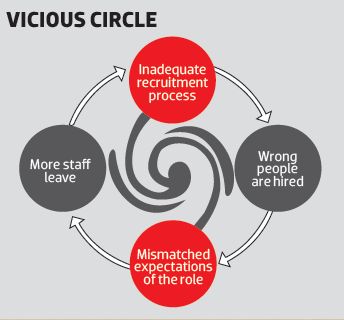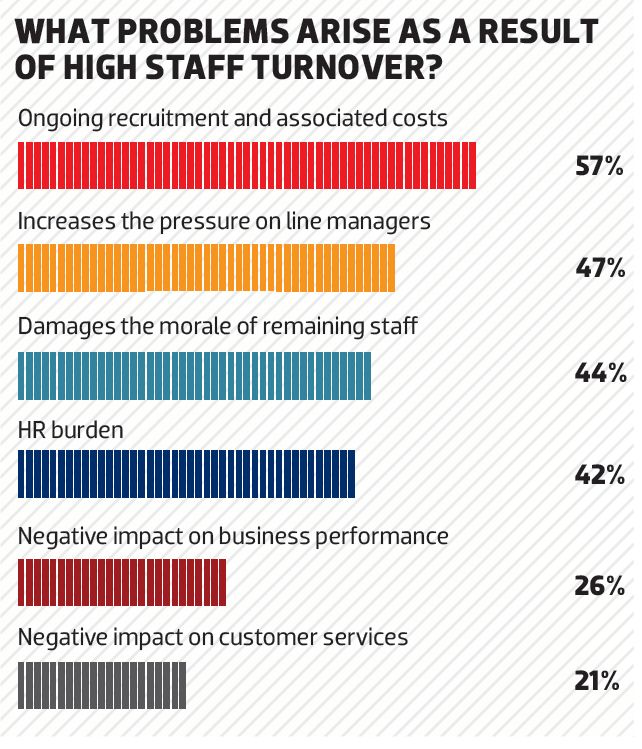Research suggests that many recruitment processes reject suitable candidates for front-line sales, service and customer service roles before they reach interview stage. Sean Howard, managing director of Talent Q, outlines the potential damage caused by using cost-effective but blunt 'weapons of mass rejection'
At a recent conference in Europe the speaker challenged the predominantly recruiter audience about their job titles. He reasoned that, if we reject over 90% of applicants, a more accurate job title would be ‘rejectors’. While it doesn’t sound like a particularly nice job title, he certainly has a point. Thanks to technology it has never been easier to find and apply for jobs, so we can be sure that numbers of applicants will continue to rise, even against the backdrop of the well-documented talent shortages.
There are two main reasons why dealing with these massive volumes of applicants is fast becoming one of the biggest challenges to HR.
1. ELIMINATING THE RIGHT TALENT
Not only are there talent shortages but in many cases we are demanding additional skills to do jobs. For example, in retail roles, customer service skills have traditionally been required; however, many retailers now demand selling skills as well.
The Talent Q database (comprised of over half a million assessments each year) tells us that approximately 40% of the working population are likely to be customer focused and 37% are going to be comfortable with upselling; however, only 12% are likely to be confident about the combination of these skills. It’s vital that employers don’t inadvertently eliminate suitable but ‘hidden’ candidates from their talent pools – and yet we see some surprising trends showing exactly that.
Inadequate recruitment processes have created a ‘vicious circle’ for recruiters, in which the wrong people are being appointed into front-line roles. Thirty-seven per cent of respondents in the Talent Q survey said they knowingly hired unsuitable candidates just to fill a role quickly.
 Click image to enlarge
Click image to enlarge
Recruiters are not describing their front-line roles with suffi cient accuracy. Forty-eight per cent of respondents claim that staff leave front-line positions because the expectations they have of the job are not matched by the reality of the role, creating frighteningly high staff turnover rates. The circle then starts again, as employers seek to hire replacement staff.
The root cause of this vicious circle is an inadequate recruitment process. Half of all organisations do not conduct any valid assessment of a candidate’s ability or personality when recruiting in volume. Just 51% of organisations use ability tests to help select the right candidates; only 47% conduct structured interviews.
In addition, many organisations eliminate people on the basis of academic achievement; unfortunately there is very little evidence of educational achievement predicting career success. So while this hurdle may reduce candidate volume, it may very well also reduce the chances of getting the right people.
Poorly designed career pages and long and confusing application processes certainly do eliminate large numbers, but will the best applicants persevere? I doubt it! Have you looked at your website or even tried applying for a job with your company lately?
 Click image to enlarge
2. REJECTING CUSTOMERS?
Click image to enlarge
2. REJECTING CUSTOMERS?
The chances are high that many of your applicants are either customers or potential customers.
It’s interesting to look at the variances in how different organisations deal with the candidate (customer) experience. Far from failing to even acknowledge an application (we are just too busy!), a few smart organisations now give something back to all applicants. This does not stop at mere acknowledgement of an application – it could be feedback and thanks, career advice, or even vouchers to buy products or services and welcome them as new customers.
Treating candidates well reinforces both your employer brand and your consumer brand. It’s worth remembering that social media means that this is no longer a one-on-one experience. Word spreads quicker than ever!
Recruiting has never been so challenging. Not only do we risk our brand every time we treat a candidate badly, but we are also at risk of never fi nding the right talent. Getting the right people in jobs in the right way will continue to have a huge impact on the future success of all organisations. Perhaps it’s time to broaden the recruitment funnel in your organisation?
Talent Q recommends the following steps to improve the recruitment process:
- Match up the key requirements of the role with a candidate’s competencies; understand what traits and competencies are key to success in a role. Recruiters can then target candidates who fit that profile.
- Use realistic job previews and situational judgment tests for front-line roles to ensure that the expectations of new recruits match the reality of the job.
- Introduce objective and fair selection methods that can be replicated in every location.
- Ensure that the entire recruitment process is engaging for candidates.
Talent Q was acquired by global management consultancy Hay Group in April 2014. Talent Q designs and delivers innovative online psychometric assessments, training and consulting, to help organisations make better, more informed decisions about their people.


